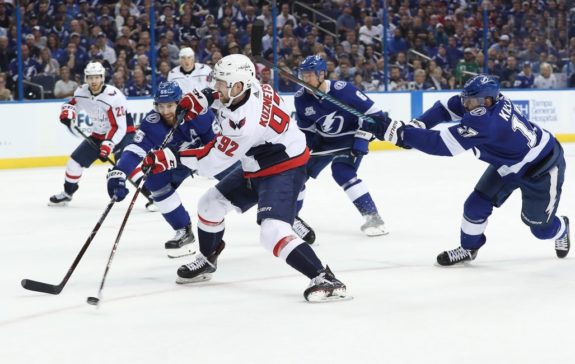Just over a month ago, the Washington Capitals found themselves in a similar predicament to the one the Tampa Bay Lightning were in heading into Game 3 of the Eastern Conference Finals.
Entering the first round of the playoffs as the top seed in the Metropolitan Division, the Capitals suffered back-to-back home losses to the Columbus Blue Jackets, squandering home-ice advantage in the series’ first two games.
The Capitals become just the 6th team in NHL history to lose in overtime of both Games 1 and 2 of a best-of-seven series at home
All 5 of the previous teams lost their respective series
— ESPN Stats & Info (@ESPNStatsInfo) April 16, 2018
Tampa Bay was similarly stunned in the first two games of the Eastern Conference Final.
As the top seed in the Eastern Conference, the Bolts had cruised through the first two rounds of the playoffs, beating both the New Jersey Devils and the Boston Bruins in five games. They entered the Conference Final as heavy favorites to beat the Capitals and move on to the Stanley Cup Final.
That was until the Capitals trounced the Lightning in Tampa Bay in the first two games of the series. It started with a 4-2 decision that chased Tampa Bay goaltender Andre Vasilevskiy before the third period began. In Game 2, the Capitals followed up in similarly dominating fashion with a 6-2 victory that had Tampa fans sarcastically cheering when the public address system announced that just one minute remained in the game.
In the conference era (since 1974-75), teams that hold a 2-0 series lead in the Conference Finals/Semifinals own an all-time series record of 39-2. #NHLStats #StanleyCup pic.twitter.com/1Jb01z1B89
— NHL Public Relations (@PR_NHL) May 14, 2018
In their first-round series against the Blue Jackets, the Capitals were able to flip the script. Washington seized momentum in Game 3 with a 3-2 victory in double overtime and never gave it up, going on to win the series in six games.
With back-to-back 4-2 victories at Capital One Arena, the Lightning were able to respond to a disappointing start to the series, much like the Capitals did against Columbus. With the series now trimmed to best of three, it is still to be determined if the Capitals will suffer the same fate that the team dealt the Blue Jackets in Round 1.
To avoid this fate, the Capitals must avoid two major pitfalls that led to the Blue Jackets’ collapse.
Lagging Special Teams

How it Hurt Columbus
Through the first two games of Round 1, the Blue Jackets were able to keep up with a Capitals power play that has proven to be one of the team’s strong points throughout the postseason. In those two games, the Capitals’ power play was highly effective, contributing five goals. However, the Blue Jackets’ power play was able to neutralize the Capitals’ dominant man-advantage by scoring four goals of its own. While the Capitals’ power play remained effective, scoring a goal in each game of the series, the Blue Jackets sputtered on the power play and did not score on the man-advantage in any of the final four games.
Outlook for Washington
Following a similar arc could spell doom for the Capitals, and indeed did in the two games played in Washington, D.C. Though the Capitals have largely carried play at 5-on-5, they’ve had a difficult time stopping the Lighting man-advantage, led by the three-headed beast of Victor Hedman, Steven Stamkos, and Nikita Kucherov.
In Game 3, the Lightning silenced a raucous Verizon Center crowd with back-to-back power play goals from Stamkos and Kucherov, while the Capitals’ man-advantage seemed out of sorts, failing to produce a goal for only the third time this postseason. In Game 4, Stamkos struck again on the power play, scoring on a one-timer from the left side for the fourth time in the series. Alex Killorn’s game-winning goal did not go down as a power-play goal in the box score, but he slid the puck underneath Washington goaltender Braden’s Holtby’s five-hole just as Capitals center Lars Eller was exiting the penalty box.
Once again, the Capitals’ power play was held off the scoreboard, going 0-for-4. With the Capitals’ effectiveness at 5-on-5, either the team’s power play has to regain its footing and keep up with a Lightning man-advantage that has looked difficult to stop, or the penalty kill has to adjust and slow down Tampa’s firepower. Most importantly, given the trend in the last two games, the Capitals would benefit immensely from staying out of the penalty box entirely.
Star Power Fading

How it Hurt Columbus
In Round 1, the Blue Jackets’ two victories were due in large part to the stellar play of Artemi Panarin, who in the regular season set the Columbus franchise record for points in a season with 82. Through the first three games of the series, Panarin had two goals, including the overtime winner in Game 1, and five assists. However, in the final three games, Panarin was held off the scoresheet completely, and the Blue Jackets struggled to find consistent offense elsewhere.
Outlook for Washington
In terms of reliance on star power, the Capitals have more reason to be optimistic than they do for their special teams. With three goals and four assists, Capitals center Evgeny Kuznetsov has arguably been the series’ best player, seemingly creating chances every time he steps on the ice.
Though Alex Ovechkin has not found the back of the net since scoring a goal in each of the series’ first two games, he still generated offense when the Capitals returned home. In Game 3, Ovechkin put nine shots on goal, and in Game 4 he delivered a beautiful backhand stretch pass that sprung Kuznetsov on the goal that tied the game 2-2. Nevertheless, with Tampa’s stars appearing to find their rhythm, Ovechkin will likely have to find his scoring touch for the Capitals to advance to the Stanley Cup Final.
Washington Capitals – Looking Ahead

All three series the Capitals have played in this postseason have been tied through four games. In the previous two, the Capitals triumphed in Games 5 and 6.
The Capitals will attempt to continue this trend and regain control of the series Saturday night at Amalie Arena in Tampa. To succeed, they should treat the team they defeated in Round 1 as a cautionary tale.